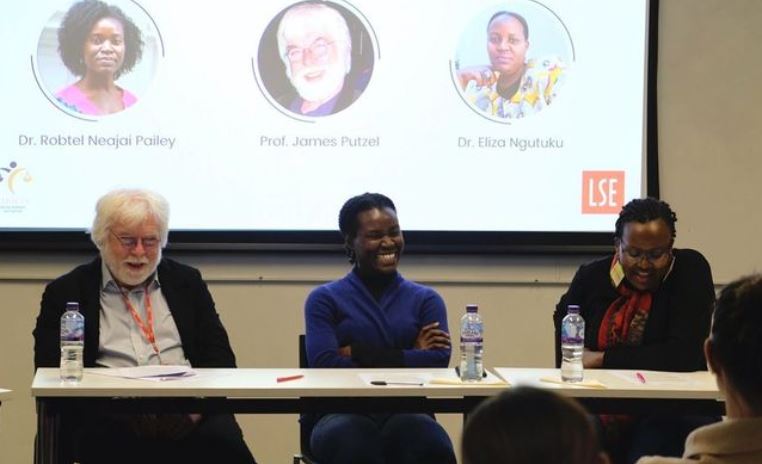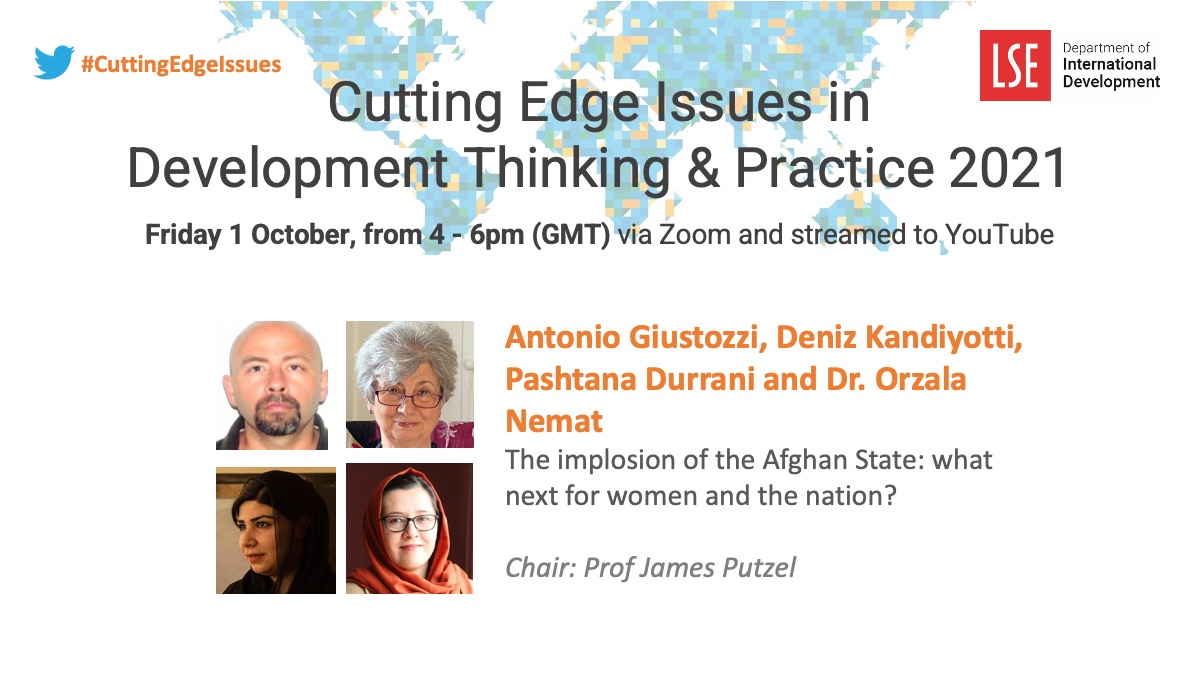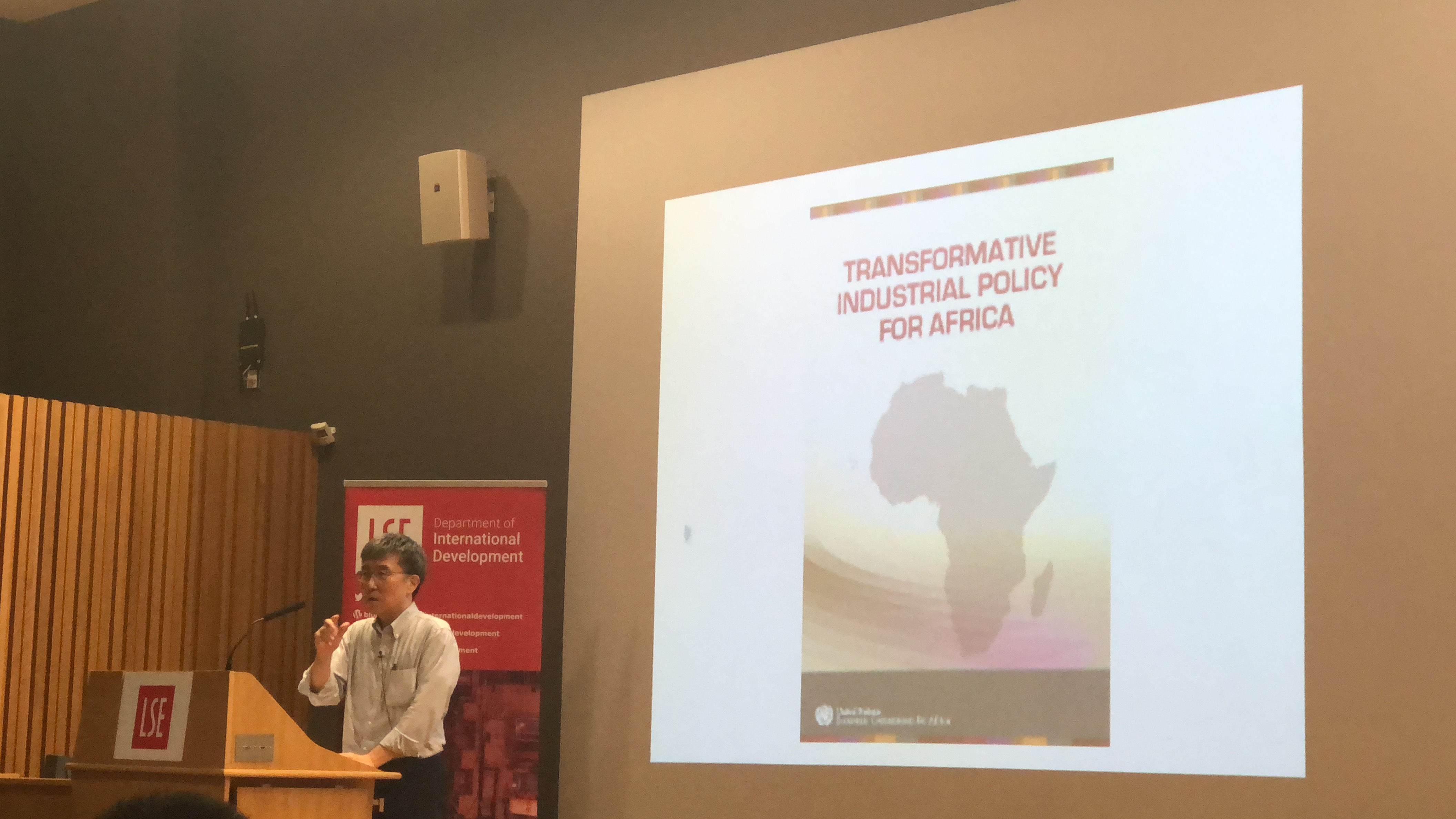On Friday 29 February, Dr. Robtel Neajai Pailey, Dr. Eliza Ngutuku, and Prof. James Putzel joined us for a panel discussion on ‘How to Start Thinking Ethically About Development’. The discussion was organised and chaired by the Ethical Development Initiative of the Department of International Development at LSE, whose main purpose is to raise awareness and provoke conversation about ethical considerations within development. Read what MSc Development Studies student Lena Stefan took away from the event below.

Dr. Pailey
“Be constantly aware of how you’re using your privilege to dismantle systems of inequality.”
Dr. Ngutuku
“Treat others the way you want to be treated.”
Prof. Putzel
“Speak truth to power.”
All three panellists find themselves in different areas within the wider field of development, thereby providing us with critical, yet different insights into their personal experiences and lessons from engaging with the ethical implications of development. Questions covered the panellists’ views on ethical considerations in development, their personal experiences, and challenges in managing ethical dilemmas during job searches in the field.
The discussion started off with a powerful statement by Dr. Pailey about her own realisation of the extractive nature of development (research), leading her to envision a different path for herself as a development professional. Prof. Putzel’s insights further illuminated the prevalent extractive approach in development research. He particularly emphasised the increasing reliance on randomised control trials, where one community receives project benefits while another is left behind. Prof. Putzel underscored the urgent need for a paradigm shift in our research practices.
Dr. Pailey offered a thought-provoking perspective on the power of language in development, a topic she’s explored extensively. She shed light on the connotations behind terms such as ‘developed,’ suggesting a sense of finality that contradicts the essence of development itself, which is a continuous journey of capability enhancement. Meanwhile, Prof. Putzel shared practical insights from his own experiences with the oversight of ethical considerations in development practice, admitting to a sense of cynicism toward the field. Despite frustrations, he’s learned valuable lessons, now emphasising the importance of gradual change and pragmatic approaches in his teaching.
Having personally encountered the adverse effects of development interventions, Dr. Ngutuku offered intriguing insights into her unique journey within the realm of development. Dr. Ngutuku’s journey into the development field started with her grassroots engagement in a community-based organisation in Kenya. Through this experience, she intimately witnessed the impact of structural adjustment programmes and Western extractivism on local communities. Inspired by these first-hand experiences, Dr. Ngutuku was motivated to travel to Europe and pursue a critical study of development, recognising the intricate interplay between colonial legacies and the field of development.
An important question that arises from the critical accounts provided by the panellists, especially pertinent to us as students of development, is how we can effectively navigate the challenge of seeking employment in this field. Professor Putzel underscores the importance of acknowledging that while systemic reform may not always be achievable, it is imperative to maintain awareness of the underlying power structures and work towards exposing them. However, he cautions against falling into the trap of self-delusion. Dr. Ngutuku added to that idea by highlighting the significance of continuous reflection on how our actions influence others and their environments within the realm of development research and practice.
Dr. Pailey brought up a particularly intriguing point that resonated with me – the irreplaceable value of experiential knowledge. She emphasised that true understanding can only be gained by immersing oneself in institutions and witnessing first-hand what occurs within them. All panellists unanimously shared their wealth of experience gained from diverse roles in consultancies, government, NGOs, and academia. Dr. Pailey left us with a crucial reminder: recognising what doesn’t align with our values and what we don’t desire is as essential as understanding what does.
The conversation was incredibly enlightening and diverse, owing to the combination of expertise from the panellists in the field, as well as their wide-ranging personal experiences, which deeply influenced their perspectives. The speakers certainly gave us much to contemplate, and specific themes stood out, making a lasting impact on the audience. Particularly emphasised by Prof. Putzel, Dr. Pailey, and Dr. Ngutuku was the importance of self-reflection. We must recognise the weight of our responsibility when entering different contexts, collecting data and conducting research within specific frameworks, and analysing it for dissemination elsewhere. As the panellists reiterated, it’s crucial to continuously challenge established truths, which are frequently concealed within narratives, paradigms, and obscured by language. Additionally, echoing Prof. Putzel’s insight, patience is essential and meaningful change often unfolds gradually and incrementally.
Last, but certainly not least, the discussion served as a reminder of the importance of engaging in ethical discourse within the development community, sharing insights and learning collaboratively from one another.
The views expressed in this post are those of the author and do not reflect those of the International Development LSE blog or the London School of Economics and Political Science.
Featured image credit: Prof. James Putzel, Dr. Robtel Neajai Pailey, and Dr. Eliza Ngutuku. Via Ethical Development Initiative Instagram.
Main image credit: https://www.pickpik.com/





